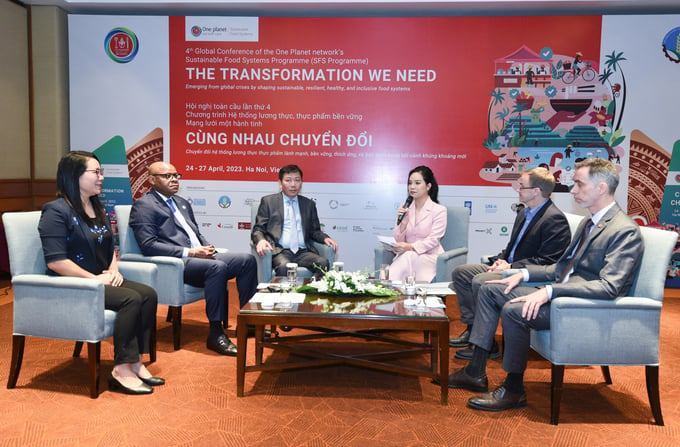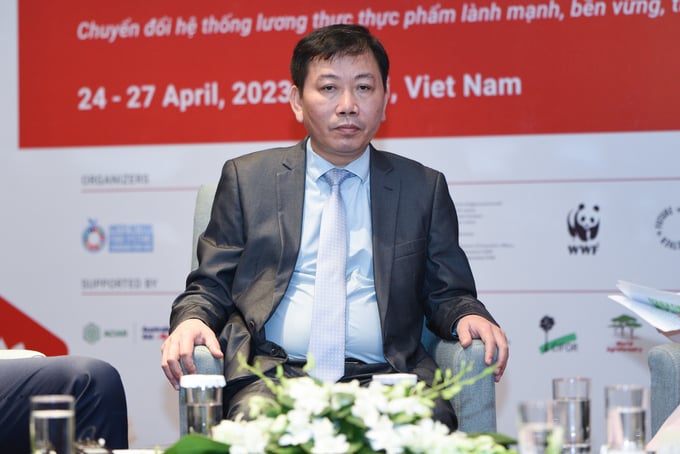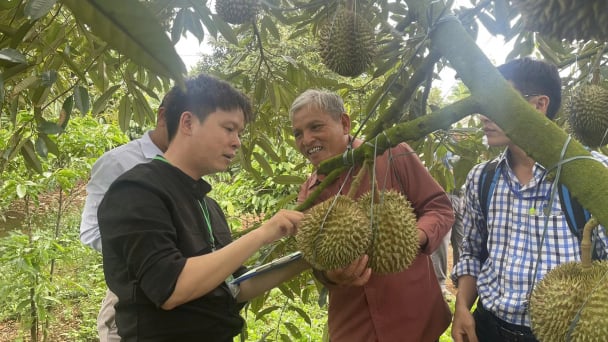May 31, 2025 | 15:47 GMT +7
May 31, 2025 | 15:47 GMT +7
Hotline: 0913.378.918
May 31, 2025 | 15:47 GMT +7
Hotline: 0913.378.918
The fourth Global Conference of the One Planet Network's Sustainable Food Systems (SFS) Programme has reached a successful ending after four days in Hanoi. This is a ministerial-level conference held by MARD in collaboration with the Secretariat of the United Nations Sustainable Food Program (SFS).
The fourth SFS's overall topic is "THE TRANSFORMATION WE NEED: Emerging from global crises by shaping sustainable, resilient, healthy, and inclusive food systems." Vietnam is the first Asian country to hold one of the world's most important food-related events.
The talk, which featured the International Cooperation Department (ICD) and international experts, took place on April 27 as part of the conference's closing session, with the goal of sharing results and prospects for the implementation of the National Action Plan to transform Vietnam into a transparent, responsible, and sustainable food system.
"We have inspired not only for Vietnam but also for countries and international partners, working together towards transforming a sustainable food system for the present and future. It is a critical juncture for everyone to act," ICD Director Nguyen Do Anh Tuan said. "Instead of arguing over concepts, theories, and methodologies, we have found answers".
Through the conference, Vietnam gained attention and strong support from international organizations to implement the National Action Plan for Vietnam Food System Transformation towards Transparency, Responsibility and Sustainability by 2030.

The discussion took place within the framework of the closing session of the conference on April 27. Photo: Tung Dinh.
According to Dr. Truong Tuyet Mai, Deputy Director of the National Institute of Nutrition, Ministry of Health, Vietnam is a pioneer in advancing to a sustainable food system. "Transforming a sustainable food system is an integrated effort, not the goal of a single unit, individual, or organization."
Dr. Truong Tuyet Mai highlighted the importance of communication education in order to change customer behavior. "I hope that we can see from a "bottom-up" approach, particularly in the context of Vietnam. This is a viewpoint I learned from friends overseas, looking at the effort of altering the consumer behavior, and shifting from the standpoint of production, processing, and transportation to the standpoint of policymakers. We need to adjust consumer behavior from the ground up in order to enhance the nutrition system, acquire a healthy diet, thus have a reverse effect on output, solidify the food system's sustainability."
According to Dr. Truong Tuyet Mai, multidisciplinary coordination and international collaboration are critical factors. "Vietnam has already established a National Nutrition Strategy, and we have included socioeconomic targets to reduce the rate of undernutrition in children to less than 15% by 2030, as well as to control the obesity rate to less than 10% in children and 20% in adults".
Mr. Remi Nono Womdim, FAO Representative, saw the 4th Global Conference on Sustainable Food Systems as an opportunity for Vietnam and other nations to underline the significance of developing sustainable food systems and government engagement in this problem. "I believe the meeting has achieved its objectives. The conference's conclusion will be an effective foundation, contributing to the next event of the 2023 UN Food Systems Stocktaking Moments which is soon to be held in Italy".

Dr. Nguyen Do Anh Tuan, Director of the International Cooperation Department (Ministry of Agriculture and Rural Development). Photo: Tung Dinh.
Vietnam has made strong commitments to take part in the Transformation of the World Food System. The country's efforts can be seen through the implementation of the National Action Plan for Vietnam Food System Transformation towards Transparency, Responsibility and Sustainability by 2030. In response to Prime Minister Pham Minh Chinh's pledge at COP26, the Government of Vietnam has tasked key ministries with developing drafts and decisions to create a transparent, responsible, and sustainable food system.
Dr. Nguyen Do Anh Tuan said, "This is not something we have to do because of our commitment to the world. This action stems from our own desires for prosperity and sustainability. We must adapt in order to achieve Vietnam's 17 Sustainable Development Goals (SDGs)".
Deputy Prime Minister Tran Luu Quang has recently signed Decision No. 300/QD-TTg, which approves the National Action Plan aimed at transforming Vietnam's food system into one that is transparent, accountable, and sustainable by 2030. The decision outlines five important tasks and solutions: I) Review the policy system; II) Transform the utilization system of inputs, natural resources, ecosystems, and the food processing system; III) Transform the agricultural production system towards transparency, responsibility, and sustainability, with a focus on developing ecological agriculture in Vietnam; IV) Transform the food processing and distribution system; V) Transform consumer perception toward responsible and sustainable consumption.
To achieve the aforementioned objectives, relevant Vietnamese authorities are going to join a Partnership on Transforming a Transparent, Responsible, and Sustainable Food System. "The partnership will have a very broad scope, far exceeding the scope of Vietnam's ministries, departments, and sectors. International organizations, corporate sector leaders, and civil society members will also be invited to participate. We intend to capitalize on all existing programs, projects, and initiatives that are being implemented in a timely and efficient way, thereby encouraging all parties to achieve greater results," said the ICD Director.

Mr. Remi Nono Womdim, FAO Representative. Photo: Tung Dinh.
Despite the fact that Vietnam has one of the world's top food production capacities, 26.6% of the Vietnamese people cannot afford good meals, and the prevalence of child malnutrition remains quite high. FAO intends to increase its assistance for Vietnam's national action program to change food systems, therefore improving nutrition and food security.
FAO has completed the development of The Country Programming Framework (CPF) 2022-2026 in collaboration with the Government of Vietnam, focusing on four key areas including One Health Approach; Climate Change Response, Environmental, and Natural Resource Management; Food Safety, Sustainable Production, and Fair Consumption, and Equitable Livelihoods; Governance, Gender, and Disabilities.
Mr. Remi Nono Womdim stated that FAO intends to implement the 2030 Agenda for Sustainable Development in the coming years. As promised by Vietnam's Prime Minister at COP26. In order to fulfill this objective, FAO wants to contribute through initiatives to change Vietnam's food system.
Translated by Linh Linh

(VAN) For the durian industry to succeed, the value chain must fulfill its commitments to the government, the community, and international partners.

(VAN) Vaccinating juvenile pangasius helps reduce disease, antibiotic use, and farming costs, increasing profits for export-oriented farmers in An Giang.

(VAN) Due to a limited supply of workforce and competitive recruitment requirements, businesses struggle to retain talented veterinary human resources.

(VAN) WOAH’s guidance aims to mitigate disease risks through a One Health approach that balances economic, conservation, and public health interests.

(VAN) Ms. Nguyen Thi Dung, Deputy Director of Ngoc Hoang Cooperative, shared about the journey of bringing dragon fruit to Europe, achieving annual revenues in the billions of VND.

(VAN) Bamboo products from Thang Tho Bamboo Cooperative have reached many countries around the world, while also creating jobs for local workers.

(VAN) The Management Board of Con Dao National Park reported that a green sea turtle, tagged in the Philippines, has traveled thousands of kilometers to lay 84 eggs on Bay Canh Islet.